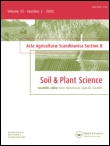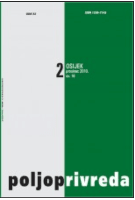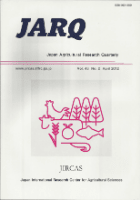
Temas Agrarios
Scope & Guideline
Advancing Agricultural Knowledge for a Sustainable Future
Introduction
Aims and Scopes
- Agronomic Research and Development:
The journal emphasizes innovative research in agronomy, focusing on crop production, soil health, and the utilization of biofertilizers and microbial interactions to enhance agricultural yield and sustainability. - Environmental Impact Studies:
It investigates the environmental implications of agricultural practices, including pest management, soil conservation, and the use of natural resources, aiming to promote sustainable agricultural methods. - Economic Analysis of Agricultural Systems:
The journal also addresses the economic aspects of agriculture, evaluating production systems, market trends, and the socio-economic factors influencing agricultural practices. - Technological Innovations in Agriculture:
Research on the application of new technologies, such as remote sensing and spectroscopy in agriculture, is a key focus, aiming to improve efficiency and productivity in farming. - Genetic Improvement and Crop Resilience:
The journal publishes studies on genetic enhancement of crops to improve resistance to diseases and environmental stresses, contributing to food security and agricultural sustainability.
Trending and Emerging
- Microbial Interactions and Biofertilizers:
Increasing attention is being given to the role of microbial interactions, such as arbuscular mycorrhizal fungi, in enhancing plant nutrition and growth, indicating a trend towards sustainable agricultural inputs. - Climate Resilience in Crop Production:
Research focusing on the resilience of crops to climate variability and environmental stressors is gaining prominence, underscoring the importance of adapting agricultural practices to changing conditions. - Sustainable Soil Management Practices:
There is a growing emphasis on sustainable soil management techniques, including the use of organic amendments and conservation practices, to improve soil health and productivity. - Innovative Food Processing Techniques:
Studies on novel food processing methods, such as the use of alternative ingredients in baking, are emerging, indicating a trend towards enhancing food quality and nutritional value. - Genetic Research on Crop Improvement:
There is a marked increase in genetic research aimed at improving crop traits, particularly resilience against pests and diseases, reflecting a shift towards biotechnological solutions in agriculture.
Declining or Waning
- Traditional Pest Control Methods:
There has been a noticeable decrease in studies focused on conventional pest control methods, likely due to a growing emphasis on integrated pest management and biocontrol strategies. - Non-Sustainable Agricultural Practices:
Research associated with non-sustainable practices is becoming less prevalent as the journal pivots towards promoting sustainability and environmentally friendly agricultural techniques. - General Reviews of Agricultural Policies:
The frequency of general reviews on agricultural policies has diminished, possibly replaced by more specific case studies and empirical research that align with current agricultural challenges. - Focus on Single Crop Systems:
There is a waning interest in research solely focused on single crop systems, as integrated farming approaches and agroecological practices gain traction in the agricultural research community.
Similar Journals

International Journal of Agriculture and Natural Resources
Bridging Knowledge Gaps in Natural Resource ManagementInternational Journal of Agriculture and Natural Resources is a premier academic journal published by the Pontificia Universidad Católica de Chile, Facultad de Agronomía e Ingeniería Forestal. With an ISSN of 2452-5731 and an e-ISSN of the same, this journal operates as an Open Access publication, allowing for the widespread dissemination of research findings pertinent to the fields of agriculture and natural resources. As of 2023, it holds a commendable Q2 ranking in Agricultural and Biological Sciences, indicating its significant contribution to the field. The journal's objective is to provide a platform for innovative research and in-depth analyses on emerging trends and challenges within agriculture, promoting sustainability and ecological balance. Covering a broad spectrum of topics, it aims to foster dialogue among researchers, professionals, and students, ultimately enhancing knowledge and fostering collaboration. With a current Scopus rank of #93 out of 221 in the general agricultural and biological sciences category, it occupies a vital role in advancing research and practices in agriculture and related disciplines.

ACTA AGRICULTURAE SCANDINAVICA SECTION B-SOIL AND PLANT SCIENCE
Transforming Research into Real-World Agricultural SolutionsACTA AGRICULTURAE SCANDINAVICA SECTION B-SOIL AND PLANT SCIENCE, published by Taylor & Francis AS, is a distinguished journal dedicated to the fields of Agronomy, Crop Science, and Soil Science. With an impressive impact factor, and categorized in Q2 for both Agronomy and Crop Science and Soil Science as of 2023, this journal is an essential resource for researchers, professionals, and students aiming to advance their understanding of soil-plant interactions and sustainable agricultural practices. Operating since 1992 and continuing through to 2024, ACTA aims to publish high-quality, peer-reviewed research that encourages the applicability of advanced scientific knowledge in real-world agricultural settings. While the journal is not open access, it remains widely accessible through institutional subscriptions, reflecting its commitment to disseminating essential findings and fostering innovation in soil and plant science worldwide. Nestled in the vibrant academic environment of Norway, ACTA AGRICULTURAE SCANDINAVICA serves as a key platform for nurturing groundbreaking research that informs sustainable agricultural policies and practices globally.

Zemdirbyste-Agriculture
Nurturing the seeds of knowledge in crop science.Zemdirbyste-Agriculture is a prominent journal dedicated to advancing the field of agricultural sciences, with a particular focus on agronomy and crop science. Published by the Lithuanian Research Centre Agriculture & Forestry, this open access journal has been fostering knowledge sharing and scientific discourse since 2004, allowing researchers, professionals, and students unrestricted access to its content. Located in the beautiful country of Lithuania, specifically at Vytautas Magnus University, this journal plays a significant role in disseminating innovative research findings. With a 2023 Scopus ranking of #246 out of 406 in the category of Agricultural and Biological Sciences, Zemdirbyste-Agriculture falls within the Q3 quartile, reflecting its growing influence in the academic community. This journal, which has converged its publication focus from 2008 to 2023, aims to provide a platform for scientists to share their critical insights on agricultural practices, sustainability, and technological advancements in crop science, thereby contributing to the global discourse on food security and environmental health.

Agrivita
Connecting scholars to elevate the field of agronomy.Agrivita is a distinguished, open-access journal dedicated to advancing research and knowledge in the fields of Agronomy and Crop Science. Published by Brawijaya University, Faculty of Agriculture, this journal has been providing a platform for high-quality scholarly articles since 2010. Located in the vibrant country of Indonesia, Agrivita plays a vital role in the exchange of innovative agricultural research, particularly within the Southeast Asian context. As of 2023, it holds a respectable Q3 ranking in its category, showcasing its commitment to scholarly excellence and visibility. With an increasing impact on the academic community, and its current Scopus rank placing it in the 48th percentile, Agrivita stands as a crucial resource for researchers, professionals, and students eager to deepen their understanding of crop science and agronomy. The journal's scope encompasses cutting-edge research that addresses both fundamental and applied aspects of agriculture, ensuring it remains relevant to today's pressing agricultural challenges. Its open access model enhances global accessibility, fostering a collaborative environment where diverse opinions and findings can converge.

Poljoprivreda
Advancing agricultural knowledge for a sustainable future.Poljoprivreda is a distinguished open-access journal dedicated to the field of agronomy and crop science, published by the FAC Agriculture Osijek in Croatia. Since its inception in 2000, the journal has been committed to disseminating high-quality research that informs both academic and practical advancements in agriculture. With an ISSN of 1330-7142 and an E-ISSN of 1848-8080, Poljoprivreda provides a vital platform for researchers, professionals, and students to engage with the latest findings and methodologies in agronomy, contributing significantly to the enhancement of agricultural practices in Croatia and beyond. Although currently ranked in the 22nd percentile within its category according to Scopus, the journal aspires to elevate its standing by welcoming innovative research that addresses contemporary challenges within the agricultural sciences. By fostering open access since 2000, Poljoprivreda ensures that its scholarly content is freely available, promoting wider dissemination and collaborative opportunities among researchers globally.

JARQ-JAPAN AGRICULTURAL RESEARCH QUARTERLY
Nurturing Ideas for Global Food SecurityJARQ - Japan Agricultural Research Quarterly serves as a pivotal platform in the field of agricultural sciences, published by the esteemed Japan International Research Center for Agricultural Sciences. Established in 1973, this journal has a rich history and plays a critical role in disseminating significant research findings relevant to agronomy, crop science, animal science, ecology, and biotechnology. Despite its ranking in the lower quartiles, with impressive coverage from 1973 to 2024, it continues to attract contributions that enhance agricultural strategies and practices in Japan and beyond. The journal facilitates discussions that are essential for fostering innovation in agricultural methodologies and environmental sustainability. Accessible to a diverse audience, including researchers, academics, and practitioners, JARQ emphasizes the importance of advancing agricultural research and its implications for food security and ecological balance.

Revista de Ciencias Agricolas
Advancing Sustainable Practices in AgricultureRevista de Ciencias Agricolas, published by UNIV NARINO, is a prominent open-access journal dedicated to advancing the field of agricultural sciences. Since its inception in 1969, this journal has been an invaluable resource for researchers, professionals, and students alike, focusing on a wide array of topics that include sustainable farming practices, agricultural technology, and rural development. With the ISSN 0120-0135 and the E-ISSN 2256-2273, the Revista de Ciencias Agricolas ensures broad accessibility to its research articles, facilitating a wider dissemination of knowledge within the agricultural community. Situated in San Juan Pasto, Nariño, Colombia, the journal is committed to providing high-quality content that addresses both local and global agricultural challenges, thereby contributing to the enhancement of food security and livelihoods across diverse populations. The journal's inclusive approach not only fosters academic discourse but also encourages innovative solutions within the agricultural sector, making it an essential platform for knowledge exchange in this vital area of study.

Romanian Agricultural Research
Fostering Dialogues for Sustainable Agricultural DevelopmentRomanian Agricultural Research is a prominent academic journal dedicated to advancing the field of agricultural science with a specific focus on agronomy and crop management. Published by the NATL AGRICULTURAL RESEARCH & DEVELOPMENT INST in Romania, this journal has established itself as an important resource within its discipline, evidenced by its Q3 ranking in the Agronomy and Crop Science category for 2023. With its ongoing publication since 2008, the journal provides a platform for researchers and professionals to disseminate their findings and share innovative practices that address the challenges faced in agricultural development. Although it operates under a non-open access model, Romanian Agricultural Research commits to rigorous peer-review processes, ensuring the high-quality content that enhances the academic community’s knowledge base. The journal's objective is to foster dialogues surrounding sustainable agriculture, improve crop yield, and contribute to the enhancement of agricultural practices globally. Researchers, professionals, and students will find this journal to be an invaluable repository of knowledge and a catalyst for future agricultural innovations.

REVISTA DE LA FACULTAD DE CIENCIAS AGRARIAS
Nurturing Ideas, Growing Solutions in Plant Sciences.REVISTA DE LA FACULTAD DE CIENCIAS AGRARIAS is an esteemed academic journal published by UNIV NACIONAL CUYO, FAC CIENCIAS AGRARIAS, located in Chacras de Coria, Mendoza, Argentina. As a pivotal publication in the fields of Agronomy and Plant Science, it has achieved a commendable Q2 ranking in both categories, indicating its relevance and impact within the scientific community. Since its establishment as an Open Access journal in 2007, it has facilitated the dissemination of crucial research, fostering collaboration and innovation among researchers, professionals, and students alike. The journal's converged years from 2008 to 2024 allow it to present contemporary advancements and discussions related to agricultural practices and plant sciences. With a strong commitment to quality and accessibility, REVISTA DE LA FACULTAD DE CIENCIAS AGRARIAS provides a valuable platform for those engaged in the crucial exploration of sustainable agricultural methodologies and plant innovations.

Ciencias Agronomicas
Empowering researchers to cultivate global food security.Ciencias Agronomicas is a prominent academic journal dedicated to the field of agricultural sciences, published by the Universidad Nacional de Rosario's Faculty of Agricultural Sciences in Argentina. This journal aims to foster innovative research and disseminate knowledge across various disciplines within agronomy, including crop production, soil health, pest management, and sustainable farming practices. Although it currently operates without an open access model, it plays a vital role in advancing agricultural research and contributing to global food security challenges. Through rigorous peer-review and the publication of high-quality articles, Ciencias Agronomicas serves as an essential resource for researchers, agronomists, and students seeking to stay informed about the latest developments and breakthroughs in the agronomic sciences. With its commitment to excellence and relevance, this journal stands as a critical platform for the dissemination of impactful research in agriculture.